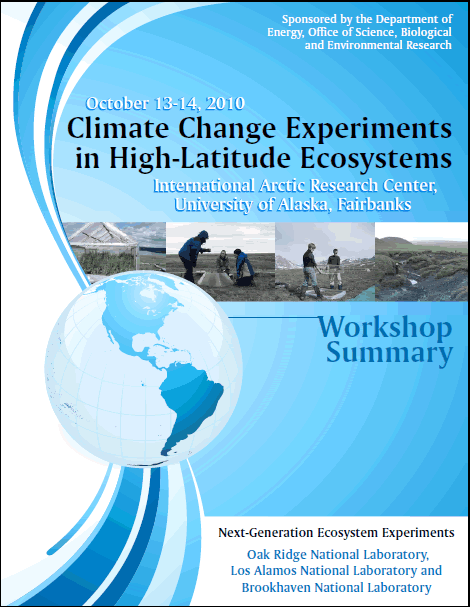Climate Change Experiments in High-Latitude Ecosystems Workshop Summary

- Workshop Dates: October 13-14, 2010
- Report Download: Fast-download PDF
- Eos, 90(17), 26 April 2011: Meeting Notes PDF
Background: A two-day climate change workshop was held October 13-14, 2010, at the International Arctic Research Center, University of Alaska, Fairbanks. The workshop, sponsored by the Department of Energy (DOE), Office of Science, Biological and Environmental Research, was attended by 45 subject matter experts from universities, DOE national laboratories, other federal agencies, and non-government organizations. Through a series of presentations and discussion sessions, participants highlighted the role of manipulative experiments and observations in understanding plot to landscape-scale processes that are unique to northern ecosystems. Speakers emphasized the sensitivity of boreal forests and Arctic tundra to atmospheric and climatic change in the coming decades. All participants were asked to consider how field studies could contribute data and insights to regional and global climate models. In addition, workshop participants identified critical needs for future global change research in the Arctic. Despite the known challenges of conducting fundamental research in cold regions, participants recommended a concerted effort to address mechanisms underlying greenhouse gas fluxes from warming and thawing permafrost. Tree line migration and shrub advancement into the tundra are also areas where integrated experiments and observations are needed. Research to address vulnerability of Arctic ecosystems to global change should be designed to characterize chemical, physical, and biological processes in sufficient detail so that representations in current climate models can be improved and that new mechanisms can be identified for future inclusion into regional and global climate models.
Given the need to quantify ecosystem-climate interactions in a warming Arctic, a framework was discussed for a new generation of manipulative experiments and observations in tundra and boreal forests driven by the need to address major uncertainties in water, energy, and carbon cycle processes. The goal would be to improve modeling and prediction of ecosystem responses and feedbacks to climate change, especially warming in these key regions. Technologies for warming air and soil were presented, along with computer simulations of their potential performance. Estimates of energy costs associated with operating such experiments were also presented. A future workshop will focus on the science, technology, and resource requirements of a DOE-sponsored Next-Generation Ecosystem Experiment (NGEE) project. This project will bring together an interdisciplinary team of scientists and engineers from national laboratories and strategic partners in support of climate change research in the Arctic.
Suggested Citation: U.S. DOE. 2010. Climate Change Experiments in High-Latitude Ecosystems Workshop Summary, U.S. Department of Energy Office of Science. ess.science.energy.gov/climate-change-experiments-high-latitude-workshop/.
